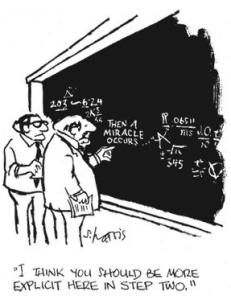 There is plenty of fraud and corruption in the world, even in the halls of science. No one has a monopoly. But there are some hot spots that deserve specific attention. Recently significant concerns have been raised about the published research of Xuetao Cao, a Chinese Immunologist. This story is newsworthy because Cao is not just any immunologist – he is also the President of Nankai University, in Tianjin, China. But more to the point – he is the Chairman of research integrity in all Chinese research. When your head of research integrity is exposed for massive scientific fraud, you have a problem.
There is plenty of fraud and corruption in the world, even in the halls of science. No one has a monopoly. But there are some hot spots that deserve specific attention. Recently significant concerns have been raised about the published research of Xuetao Cao, a Chinese Immunologist. This story is newsworthy because Cao is not just any immunologist – he is also the President of Nankai University, in Tianjin, China. But more to the point – he is the Chairman of research integrity in all Chinese research. When your head of research integrity is exposed for massive scientific fraud, you have a problem.
Here is a thorough treatment of the evidence for fraud, which covers over 50 published papers. The fabrication of data was noticed because much of it has to do with pictures, of either western blots, gels, flow cytometry images, and microscopy images. There appears to be two general types of fabrication going on. One type results from sending the same sample multiple times through analysis, but treating the data as if it came from different samples. In this case the resulting imaging will be strikingly similar in pattern, but not identical. The second type of fabrication is to simply photoshop copy and paste images.
Either way, the resulting data fabrication is undeniable once it is noticed. The images are simply too similar (and again, sometimes identical) to be genuine data. Once researchers started pouring through Cao’s other papers, the extensive fraud became obvious. When confronted with this revelation online, Cao responded by first standing behind his work, then stating:
Nevertheless, there is no excuse for any lapse in supervision or laboratory leadership and the concerns you raised serve as a fresh reminder to me just how important my role and responsibility are as mentor, supervisor, and lab leader; and how I might have fallen short.
Wow – you see what he just did there? He simultaneously apologized and took responsibility, but only for failure of supervision. So essentially he is throwing all of the people who work for him under the bus. Either way, however, this is really bad for Cao. Even in the best case scenario, all the fraud was perpetrated by others under his watch. Keep in mind, he is in charge of research integrity for all of China, but apparently can’t keep an eye on his own lab. There are certainly famous cases where research assistants were the ones perpetrating the fraud. Another immunologist, Jacques Benveniste, claimed to have evidence of immunological activity from high “homeopathic” dilutions. An investigation found his results to be highly unreliable at least, and likely straight-up fraudulent (although may have been do to really sloppy techniques and bias). But it also appears that the positive results all seemed to come from one lab assistant, Elizabeth Davenas – certainly a disturbing pattern.
Perhaps a similar pattern will emerge from Cao’s lab, but it seems unlikely that an overzealous assistant can be responsible for data fabrication in 50 published studies. This is clearly a systemic problem.
Continue Reading »


 Genetic engineering is a rapidly progressing scientific discipline, with tremendous current application and future potential. It’s a bit dizzying for a science communicator who is not directly involved in genetics research to keep up. I do have some graduate level training in genetics so at least I understand the language enough to try to translate the latest research for a general audience.
Genetic engineering is a rapidly progressing scientific discipline, with tremendous current application and future potential. It’s a bit dizzying for a science communicator who is not directly involved in genetics research to keep up. I do have some graduate level training in genetics so at least I understand the language enough to try to translate the latest research for a general audience. There is plenty of fraud and corruption in the world, even in the halls of science. No one has a monopoly. But there are some hot spots that deserve specific attention. Recently significant concerns have been raised about the published research of Xuetao Cao, a Chinese Immunologist. This story is newsworthy because Cao is not just any immunologist – he is also the President of Nankai University, in Tianjin, China. But more to the point – he is the Chairman of research integrity in all Chinese research. When your head of research integrity is exposed for massive scientific fraud, you have a problem.
There is plenty of fraud and corruption in the world, even in the halls of science. No one has a monopoly. But there are some hot spots that deserve specific attention. Recently significant concerns have been raised about the published research of Xuetao Cao, a Chinese Immunologist. This story is newsworthy because Cao is not just any immunologist – he is also the President of Nankai University, in Tianjin, China. But more to the point – he is the Chairman of research integrity in all Chinese research. When your head of research integrity is exposed for massive scientific fraud, you have a problem. Continued from Part I
Continued from Part I What does it mean to be scientifically literate? There is no completely objective answer to this question, it can be defined in multiple ways and the bar can be set anywhere along a spectrum.
What does it mean to be scientifically literate? There is no completely objective answer to this question, it can be defined in multiple ways and the bar can be set anywhere along a spectrum.




